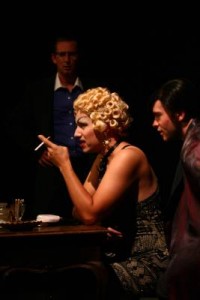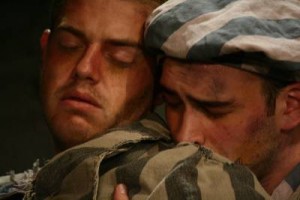RECOMMENDED
With anti-gay violence spiraling throughout the world, the time seems apt indeed for Diversionary Theatre’s thirtieth-anniversary revival of Martin Sherman’s gut-wrenching Holocaust drama Bent. Though occasionally hampered by some problematic technical/design elements, this beautifully acted production is a powerful reminder of our not-so-distant past, and of the dangers of anti-gay bigotry gone amok.
One can’t help wondering how London audiences must have reacted to Bent’s world premiere production thirty years ago, or Broadway audiences later that year. It was, after all, only a decade post-Stonewall, and any idea of gay marriage or of gays serving openly in the military was pretty much unimaginable back then. The AIDS virus was lurking in the blood of the earliest of its victims, but a plague that would decimate the gay community was equally inconceivable. Little had been written at that time about the persecution and mass murder of gays in Nazi Germany. In fact, few plays had even dealt with gay themes in a non-judgmental manner, let alone presented an image of two men whose love was more powerful than the forces of evil and hatred around them. Revolutionary indeed was Martin Sherman’s Bent, and even thirty years later, it has lost none of its power to shock, terrify, and move audiences to tears.
The play begins innocently enough. Max, a young man with a bitch of a hangover is brought morning coffee by his boyfriend Rudy, even though it’s already three in the afternoon. Rudy begins complaining about his dying plants, his tiresome job, and about the fact that the rent is three weeks overdue. Nothing too out of the ordinary in that. A naked blond man enters bleary-eyed, then stumbles into the bathroom, and again, nothing remarkable, either in the young man’s presence in Max and Rudy’s apartment or in the occurrence of brief full-frontal nudity in a gay-themed play. Max and Rudy go on to discuss last night’s three-way (Max and Wolf had gotten rough with each other and Rudy felt ignored) and the two lovers try to come up with ways they might find to pay their overdue rent. Max attempts to get rid of Wolf and also to correct any notion the hirsute young hunk may have gotten that Max is rolling in dough. In the meantime, someone’s knocking on Max and Rudy’s door, most likely the landlord wanting his rent, right?
Wrong. The Gestapo have come to call, a pair of gun-toting officers with an order for Wolf’s arrest. When the young man attempts to escape, he is shot and then his throat is slit. Max and Rudy manage to make their escape, but they will not remain free for long, and only one will survive the train ride to Dachau.
Playwright Sherman has much more on its mind than simply telling another Holocaust story, albeit one that was little known in 1979. Bent is the account of one man’s journey towards self-worth, towards love, and towards salvation, though at a higher cost than he could ever have imagined. Be forewarned. There are no happy endings here. In fact, the first time I saw Bent on stage several years ago, I couldn’t get out of my seat for perhaps five minutes after its final fadeout.
Still, there are plays that cry out to be seen, despite their bleak subject matter, and Bent is one of them.
Diversionary’s thirtieth anniversary revival (a co-production with Ion Theatre Company) benefits first and foremost from its outstanding cast, once again proving that the San Diego acting community is one of Southern California’s hidden treasures. Their assignments are not easy, as Sherman’s dialog can waver somewhere between poetic and artificial, as in a scene between Max, fellow prisoner Horst, and a concentration camp guard. At other times, the script comes across as if originally written in German, with that vaguely stilted quality that translations seem often to have. Despite these acting challenges, the cast acquit themselves more than admirably under Glenn Paris and Claudio Raygoza’s capable direction.
Michael Zlotnik leaves an indelible impression as Max (a role originated on Broadway by a young Richard Gere). As Max’s casual “Whatever…” attitude is replaced by a growing awareness that there are things, and people, worth caring about, and worth dying for, Zlotnik’s performance grows in depth and power. Opposite him, San Diego musical theater favorite Charlie Reuter gives a career-altering performance as Horst, the out-and-proud gay man who changes Max’s life for good. In Zlotnik and Reuter’s talented hands, Bent’s most famous scene, in which concentration camp prisoners Max and Horst make love without ever touching, or even looking at each other (any physical or eye contact being punishable by death), is theater at its most compelling—and the two men’s final scene is truly shattering.
Chris Buess too does standout work as Rudy, whose horn-rimmed glasses mark him as a member of the intelligencia, thus sealing his fate. As Max’s uncle Freddie, Walter Ritter creates a memorable portrait of an older gay man who’s been successful up till now in hiding his homosexuality. Phillip John is frighteningly believable as a brutal Nazi officer (was there any other kind?), backed up by a fine Eric Dowdy as his subordinate. Bobby Schiefer impresses as both naked Wolf and the uniformed guard who explains the rules of the concentration camp to Max. Finally, a sensational, unrecognizable Steven Lone disappears into the skin of Marlene Dietrich-esque female impersonator/entertainer Greta, a presumably straight man who goes “where the money is.”
Where this particular production of Bent could be more successful is in some of its technical and design elements. Jeannie Galito’s costumes are excellent, from 1930s street wear to Nazi and concentration camp uniforms to Greta’s slinky evening gown, and Courtney Fox Smith has done a great job with Greta’s hair and makeup. On the other hand, a more ingenious set design by Raygoza and assistant director Bret Young could have made the first act’s five scene changes less clunky and time-consuming (though sound designer Omar Ramos’s effective background music does help maintain mood and suspense). There’s also the matter of the black curtain backdrop, which on its right side seems to be lacking a number of rings, revealing a good deal of the Act 2 set. Though this may be the designers’ attempt at foreshadowing, it comes across as distracting and puzzling. The second act set is stark and effective, though, with its piles of rocks and its electrified fencing. Chris Renda’s lighting is generally very good, though I couldn’t help feeling that Max and Horst’s love scene could have gained even more power had it been more dramatically lit, and the play’s very last moment didn’t have quite the stomach-punch effect it might have had with a more impactful lighting design—and staging. Though I understand budget constraints, Smith might have found a more natural wig for Rudy’s Act One scenes (this one appears to have been borrowed from a retired department store mannequin), and prerecorded gun shots fall flat when compared to the live shots fired in a pair of plays I happened to have seen the two previous days. Though my my quibbles pale when compared with the quality of the acting, for me they did mean the difference between good-to-excellent and downright outstanding.
Still, I have no hesitation in recommending this beautifully acted Bent. Zlotnik and Reuter’s work alone makes it well worth seeing, and for any young gay man who takes his Hillcrest good life for granted, it should be required viewing. History does have a way of repeating itself, lest we forget—and Bent helps us to remember.
Diversionary Theatre, 4545 Park Blvd., San Diego.
www.diversionary.org
–Steven Stanley
November 1, 2009
Photos: Daren Scott




 Since 2007, Steven Stanley's StageSceneLA.com has spotlighted the best in Southern California theater via reviews, interviews, and its annual StageSceneLA Scenies.
Since 2007, Steven Stanley's StageSceneLA.com has spotlighted the best in Southern California theater via reviews, interviews, and its annual StageSceneLA Scenies.







 COPYRIGHT 2024 STEVEN STANLEY :: DESIGN BY
COPYRIGHT 2024 STEVEN STANLEY :: DESIGN BY